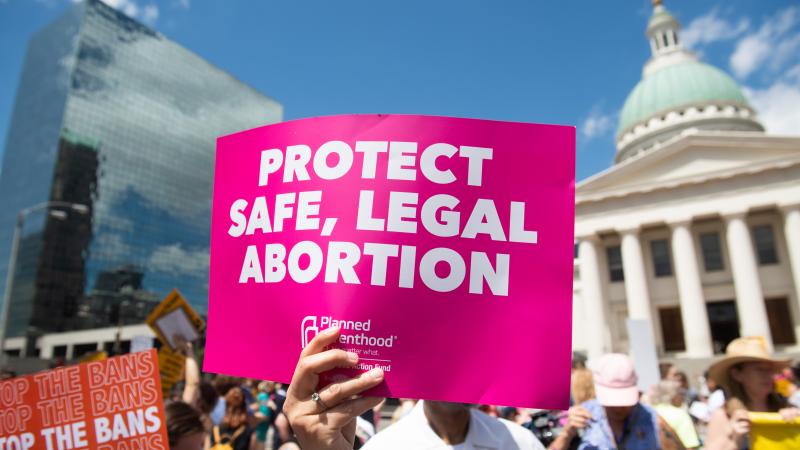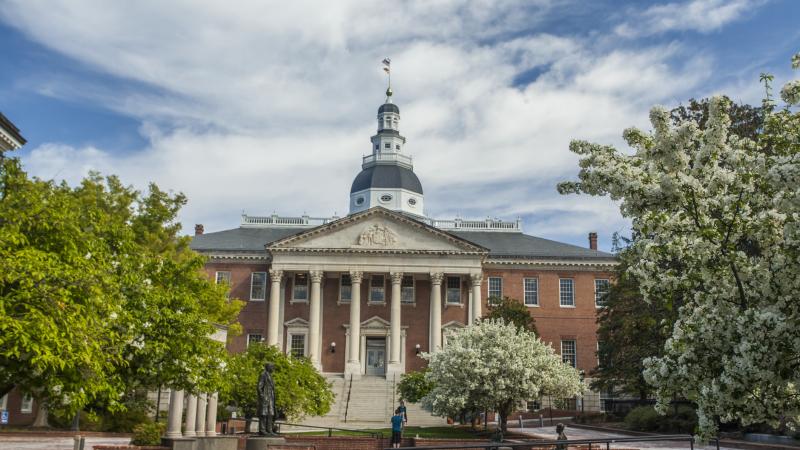Historic win by Texas Republican Mayra Flores latest sign Hispanics ditching Democrats
Polling shows Hispanic voters overwhelmingly disapprove of Biden as GOP sees major opportunity
Newly minted Republican Rep.-elect Mayra Flores's electoral victory in Texas marked the latest warning sign for Democrats that Hispanic voters are increasingly dissatisfied with their agenda and potentially shifting to the Republican Party.
Flores made history on Tuesday night, becoming the first Mexican-born woman elected to Congress after she defeated Democratic opponent Dan Sanchez by 8 points in the special election for Texas's 34th Congressional District. Incumbent Filemon Vela (D.) vacated the seat in March.
A Republican hasn't represented the heavily Hispanic area along the nation’s southern border in the Rio Grande Valley since 1870, according to the Houston Chronicle.
"The Democrat Party has been in control here in South Texas for over 100 years and feel entitled to our vote. They feel they don't have to do anything to earn our vote," Flores told Fox News on Wednesday. "We sent a strong message to Washington, and we sent a strong message to the Democrat Party, that you have to get to work. If not, you're going to get voted out."
Flores's victory excited Republicans about the prospect of making major gains among Hispanic voters.
"This is a sign of things to come!" tweeted Anna Paulina Luna, a Hispanic-American of Mexican descent who's running for Congress in Florida's 13th District. "The Hispanic voting bloc has shifted RED and will move elections from here on out!"
"This is clearly a historic win and potentially very telling for what the future has in store," Saul Anuzis, former chairman of the Michigan Republican Party, told Just the News. "Republicans have successfully been expanding our party while the far-left progressives make it clear this isn't your parents' Democratic Party anymore."
Beyond Flores's victory, the GOP is also encouraged by poll numbers that are likely keeping some Democrats up at night.
Perhaps most striking, a poll released by Quinnipiac University last week found that just 24% of Hispanic voters approve of President Biden's job performance. That followed another Quinnipiac survey from last month that found only 26% of Hispanics approve of Biden's performance, while 60% disapprove and 13% said they didn't know or had no opinion.
Biden's approval rating among Hispanics has been below the mid-30s for several months now, according to polling.
"Hispanics have also expressed concern about the direction of the country," said Mark Hugo Lopez, director of race and ethnicity research at the Pew Research Center. "There's growing dissatisfaction among Latinos about the direction of the country."
Recent polling has shown the majority of Hispanic voters in key contested states such as Arizona and Pennsylvania believe the country is headed in the wrong direction.
When discussing attitudes of Hispanic voters, many observers tend to point to immigration as reason for their dissatisfaction with Biden and Democrats.
Indeed, over the past year, polling has consistently shown that a strong majority of Americans — and upwards of 70% of Hispanics — disapprove of Biden's handling of immigration, including the southern border.
Since Biden entered office, there has been a sharp rise in the number of people who have crossed the southern border illegally. The figure reached about 2.4 million from April of last year to this past April, the last month for which there is publicly available data and the month with the highest number of migrant encounters during the Biden administration at 234,088.
By comparison, there were just over 626,000 such crossings from January 2020 to January 2021, former President Trump's last year in office.
"We Latinos don't want open borders," Rep. Maria Salazar (R-Fla.) told Just the News in April.
However, immigration isn't the most important issue to Hispanics, according to the data.
"We have seen issues most important to Hispanic voters were economic issues, health care — generally the same issues that are most important to the overall population," said Lopez.
Recent polling by Future Majority found that inflation is the top issue for Hispanics in critical swing states.
"I think that a lot of the time, there's this narrative in D.C. among Democrats that you only talk to Latinos about immigration," John Anzalone, a pollster for Biden, said on a Politico podcast in April. "Like, immigration is the 12th issue that they're concerned about. Guess what? They're concerned about the same things everyone else is concerned about. It's always about the economy or inflation or health care or schools."
That may not be good news for Biden and Democrats. According to the Quinnipiac poll from last week, just 20% of Hispanics approve of Biden's handling of the economy, while 68% disapprove.
Inflation has reached its highest levels in the U.S. in over four decades while the average price of gasoline hit $5 a gallon, an all-time record.
"Gas prices are hurting minorities more than anyone else as they feel the pain of inflation," said Solomon Yue, national committeeman of the Oregon GOP. He added that while the economy, crime, immigration, and other issues are top priorities for Americans worried about putting food on the table and filling up their tanks, Democrats appear "tone-deaf" as they focus on their probe into the Jan. 6, 2021 Capitol riot.
While Lopez cautioned it's too soon to conclude that Hispanics, a traditionally reliable Democratic voting bloc, are moving en masse to the Republican Party, the numbers indicate that process could be under way.
In April, a Marist poll showed 52% support for the GOP among Hispanics, and just 39% support for Democrats.
The National Republican Congressional Committee's Battleground Survey Project found that Republicans have made substantial gains among Hispanic voters since the 2020 elections, narrowing the gap by almost 20 percentage points.
Other polling has shown Hispanics evenly split between Democrats and Republicans, a seismic shift from what was once a lopsided balance in favor of Democrats.
Even polling finding a less dramatic shift still shows Hispanics are now migrating across party lines to the GOP.
In 2020, 38% of Hispanic voters voted for Trump, up from 30% in 2016 and more than the percentage that backed Mitt Romney in 2012 and John McCain in 2008, according to Pew Research.
Lopez said that it's not new for a significant percentage of Hispanics to vote for Republicans, noting that about 35% supported Ronald Reagan in the 1980s and over 40% backed George W. Bush in the early 2000s.
"We've been here before," he said. "But we have seen over the last six years that Hispanic voters are voting more for Republican presidential candidates than in previous years."
Beyond the economy and immigration, Republicans see the values of the Hispanic community as a common link with traditional, conservative Americans.
"Hispanics are traditionally conservative Catholic voters that don't like the crazy left's ideas any more than anyone else," said Anuzis. "They share the same values every other American has and cares about. A shift in Hispanic votes from blindly following Democrats to voting their conscious and beliefs is a big win for Republicans."
Former Arkansas Gov. Mike Huckabee (R) echoed that sentiment on the "Just the News, Not Noise" television show on Wednesday while explaining the message that Flores's victory sends to both parties.
"What I think it's saying is that you [Democrats] just can't keep doing these policies and expect people to follow you blindly," said Huckabee. "I think it sends a message to the Republicans that we shouldn't give up on going after voters that have not voted Republican in the past, whether it's African Americans, or Hispanics, or for that matter, anybody, because I don't care who you are, you're feeling the full brunt of Democrat policies."
One example where a clash of values has been evident is with the term "Latinx," an attempt by left-wing progressives to refer to Latinos with gender-neutral terminology. Polling shows most Hispanics and Latinos don't like to be called Latinx and a significant number are "offended" by the term.
Flores said Wednesday she had won because she stood up "for our values. God, family, our community. That's who we are in South Texas. We're all about hard work."
Among the many people who voted for her, Flores gained the support of one particularly prominent voice.
"I voted for Mayra Flores — first time I ever voted Republican," tweeted Elon Musk, the world's richest man. "Massive red wave in 2022."
Many Republicans see Flores's victory as a bellwether of what's to come in November.
"It's going to be a big, big train — this is a preview for November 2022," said Yue. "I expect big gains in these midterms. When your political opponent is making so many mistakes, don't interrupt them. Just let it happen."
Flores, a respiratory therapist and the wife of a U.S. Border Patrol agent, will hold office for the remainder of this congressional term and run for reelection in November. She'll face Democratic Rep. Vincente Gonzalez, who represents a neighboring district and will run in the newly drawn 34th District.
















